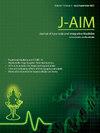瑜伽个人优秀量表的开发和验证
IF 1.9
Q3 INTEGRATIVE & COMPLEMENTARY MEDICINE
引用次数: 0
摘要
在他的《瑜伽经》中,帕坦伽利描述了个人卓越(PE)的原则、过程、实践和障碍。与帕坦伽利的观点不同,现有的体育概念和测量方法集中在量化幸福感、领导有效性、专业能力、学术和体育表现以及动机上。然而,到目前为止,尚无基于瑜伽的可操作模型或PE测量方法存在。本研究旨在开发和验证一种新的瑜伽个人卓越自我报告量表(YPEI),其结构来源于瑜伽个人卓越量表。材料和方法研究分三个严格阶段进行,以建立YPEI的信度和效度。首先,十名专家对“国际根除国际行动”项目的内容进行了框架和验证。其次,对721名参与者进行探索性因子分析(EFA)。然后对364名参与者进行了YPEI,以确认探索的因素结构。最后,通过计算与vikruti subdosha问卷、吠陀人格量表和个人效能量表三个标准测量的相关性来评估YPEI的工具间收敛效度和判别效度。结论心理无能、依恋、绝望、存在主义思维、躯体疾病、懒惰、放纵、不稳定8个因素对模型拟合较好。正如假设的那样,PE与个人效能和吠陀人格呈正相关,但与维克鲁蒂呈负相关。YPEI将适用于测量健康/不健康个体的心理和身体疾病以及合并症,并规定所需的个性化生物-心理-社会-精神方案,以最大限度地减少它们并最大化PE。本文章由计算机程序翻译,如有差异,请以英文原文为准。
Development and validation of Yogic Personal Excellence Inventory
Background
In his Yoga Sutras, Patanjali delineates the principles, processes, practices, and impediments of personal excellence (PE). Unlike Patanjali's perspective, existing conceptualizations and measures of PE are centered on quantifying well-being, leadership effectiveness, professional competence, academic and sports performance, and motivation. However, no yoga-based operationalized model or measure of PE exists to date.
Objectives
This study aimed to develop and validate a novel self-report yogic personal excellence inventory (YPEI) with constructs derived from the PYS.
Materials and methods
The research was conducted in three rigorous phases to establish YPEI's reliability and validity. Firstly, the YPEI's items were framed and validated for their content by ten experts. Secondly, the first draft of the YPEI was administered to 721 participants for exploratory factor analysis (EFA). The YPEI was then administered to 364 participants to confirm the explored factor structure. Lastly, YPEI's inter-instrument convergent and discriminant validity were assessed by computing correlation with three criteria measures―the vikruti subdosha questionnaire, the vedic personality inventory, and the personal efficacy scale.
Conclusion
The model was a good fit with eight factors (psychic incompetence, attachment, despair, existential thinking, somatic illness, laziness, indulgence, and instability). As hypothesized, PE was positively associated with personal efficacy and vedic personality but negatively with vikruti. YPEI will be applicable to measure the psychic and physical morbidities and comorbidities of healthy/unhealthy individuals and prescribe the required personalized bio-psycho-socio-spiritual protocol to minimize them and maximize PE.
求助全文
通过发布文献求助,成功后即可免费获取论文全文。
去求助
来源期刊

Journal of Ayurveda and Integrative Medicine
INTEGRATIVE & COMPLEMENTARY MEDICINE-
CiteScore
4.70
自引率
12.50%
发文量
136
审稿时长
30 weeks
 求助内容:
求助内容: 应助结果提醒方式:
应助结果提醒方式:


